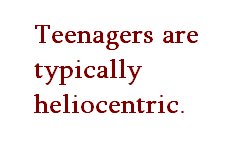The central purpose of English teaching goes beyond mere literacy skills. It is the role of education as a whole to facilitate the growth of student literacy. What makes English unique is that it is a subject where the student can grow as a human being. Literature is the gateway to the human experience, by which students are able to explore who they are in context with people who have lived and are living on this planet called Earth.
 Teenagers are typically heliocentric. For our students to travel further along the road to maturity means they must become “other-orientated”. Through literature, students are able to live—sometimes intimately—the lives of another person or persons, whether it is the lives of the characters or the authors themselves. Students experience passions, hatreds, evils, acts of courage and heroism; they encounter worldviews and philosophies broader and deeper than their own, all of which allow them to transcend the suburban jungle of X-boxes and MSN. Literature helps to put the students in chronological context as well. Literature connects students to the past, the history, philosophy, worldviews, etc., that laid the ground work for the world we currently live in.
Teenagers are typically heliocentric. For our students to travel further along the road to maturity means they must become “other-orientated”. Through literature, students are able to live—sometimes intimately—the lives of another person or persons, whether it is the lives of the characters or the authors themselves. Students experience passions, hatreds, evils, acts of courage and heroism; they encounter worldviews and philosophies broader and deeper than their own, all of which allow them to transcend the suburban jungle of X-boxes and MSN. Literature helps to put the students in chronological context as well. Literature connects students to the past, the history, philosophy, worldviews, etc., that laid the ground work for the world we currently live in. By gaining a better understanding of the human experience, students will become better communicators. Ultimately, people talk to people. The best writers or speakers are those who can empathize with their readers/listeners. I would argue that communication is a fundamental aspect to the human experience. As an English teacher in a secular school setting, I have the privilege of encouraging my students to become better communicators by teaching them—through literature—what it means to be human. Everything else I do—grammar, essay writing, critical thinking, vocabulary, literary devices, etc.—are secondary to this the central purpose of English.
The implementing of this central purpose requires a “good” selection of literature, which is not as nebulous to discern as the average post-modern critic would suggest. In my classroom, we spend considerable time discussing and working through texts, paying close attention to characters’ thoughts, actions and motivations and their mistakes, acts of courage, judgements etc.. We also look at authors of texts as well as characters in the texts themselves. For me, the historical and cultural context of a work is almost as important as the work itself. In other words, I am not a New Criticism subscriber. I believe my students need the historical context to benefit most from the text. I want my students to come to the text listening for a “voice” from the text. I want my students, before they come to the text, to leave behind what they “know” and seek instead to learn something they don’t know. Once they have heard the story of other human beings, heard the voice of characters, writers, philosophers, then they can compare their own worldviews. I ask my students to listen first, talk second, to take in before they opine. I believe this will make them mature humans, good citizens and effective communicators.
Jesus said, "YOU SHALL LOVE THE LORD YOUR GOD WITH ALL YOUR HEART, AND
 WITH ALL YOUR SOUL, AND WITH ALL YOUR STRENGTH, AND WITH ALL YOUR MIND; AND YOUR NEIGHBOR AS YOURSELF." (Luke 10:27). In good literature, as in all good art, we see the evidence of God’s communicable attribute: creativity. We also see the beauty of God. By reading, understanding and enjoying good literature, we can come closer to “loving the Lord” with “all your mind”. As for “loving your neighbour”… If reading literature is like walking in another man’s shoes, then literature can help us how to love another human.
WITH ALL YOUR SOUL, AND WITH ALL YOUR STRENGTH, AND WITH ALL YOUR MIND; AND YOUR NEIGHBOR AS YOURSELF." (Luke 10:27). In good literature, as in all good art, we see the evidence of God’s communicable attribute: creativity. We also see the beauty of God. By reading, understanding and enjoying good literature, we can come closer to “loving the Lord” with “all your mind”. As for “loving your neighbour”… If reading literature is like walking in another man’s shoes, then literature can help us how to love another human.





No comments:
Post a Comment